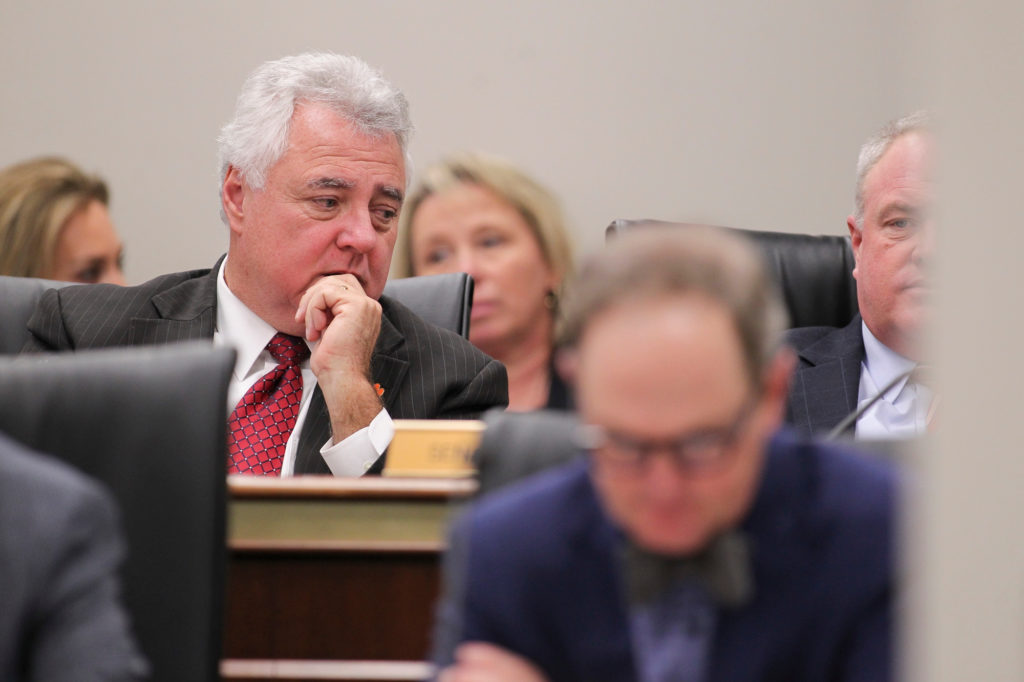There is finally a vehicle in place for South Carolina lawmakers to do something they should have done over a decade ago – sell state-owned utility Santee Cooper.
That doesn’t mean it’s going to happen though …
And even if it does happen, will a deal really do anything to help beleaguered Santee Cooper ratepayers? Or for that matter, ratepayers of the state’s electric cooperatives (most of whom are already billing customers at exorbitantly high rates)?
Also … what does the S.C. General Assembly’s malevolent, multi-decade mismanagement of this asset say about its leaders’ ability to broker such an agreement?
Lawmakers refused to sell this asset when it could have netted the state billions of dollars – now they are essentially being forced to unload it as part of a deal that will (hopefully) cover its massive $8 billion debt.
Don’t get us wrong, one way or another we believe this albatross must be jettisoned. Or at the very least rescued from chronic governmental mismanagement.
Unfortunately, South Carolina has arrived at this common sense realization in a most painful, costly fashion … namely the spectacular collapse of the V.C. Summer nuclear generating station expansion project in Jenkinsville, S.C., a.k.a. #NukeGate.
(Click to view)

(Via: High Flyer)
To recap: In 2007, state leaders embarked on a catastrophically mismanaged bid to build a pair of next generation nuclear reactors using billions of dollars in government debt – while simultaneously socializing the investment risk undertaken by Santee Cooper’s “private sector” partner (SCANA).
The socialization of SCANA’s investment risk was accomplished via the now-notorious “Base Load Review Act,” a piece of special interest legislation approved by the state’s Republican-controlled legislature that provided for the project to be partially paid for via consumer rate hikes.
What happened next is history …
In the summer of 2017, Santee Cooper pulled the plug on the project – a bombshell announcement made just one week after its politically appointed board proposed fresh rate increases related to the construction of V.C. Summer’s two reactors. Shortly thereafter, the utility gave its former leader a multimillion-dollar, taxpayer-subsidized golden parachute – even though documents released in September 2017 showed he and others knew in 2016 (and perhaps earlier) that the Jenkinsville, S.C.-based project was doomed.
[su_dominion_video_scb]Oh, Santee Cooper has been paying for this former CEO’s massive legal bills as it stares down the business end of a criminal investigation.
Still think government should be in the power generation business?
Hell no … but getting the state out of that business is proving trickier than expected.
Legislation (S. 678) introduced yesterday by Senate president Harvey Peeler would put the fate of Santee Cooper squarely in the hands of governor Henry McMaster – allowing his administration to review bids for the utility and select what it believes to be the best deal for the state.
Proceeds from the sale (assuming there are any) would flow into the state’s general fund.
Given that lawmakers rarely cede authority to the state’s constitutionally neutered executive branch of government, many assumed Peeler’s bill was indicative of a “done deal” – one that would require McMaster to merely rubber stamp an agreement already negotiated behind closed doors.
Within hours, though, it became clear that was not the case.
(Click to view)

(Via Travis Bell Photography)
Senators – including fiscally liberal Republican Larry Grooms (above) and Democrat Darrell Jackson – bristled at the legislation. Grooms was upset over efforts to ram the bill through after what he deemed to be insufficient debate, while Jackson (and powerful Senate finance chairman Hugh Leatherman) were upset that Peeler had given so much authority to McMaster.
Grooms – along with state senators Stephen Goldfinch, Margie Bright-Matthews and Thomas McElveen – are viewed as the key swing votes on the resolution. Of course even if they fall in line, the bill faces problems in the S.C. House.
Leaders we spoke with in that chamber flatly rebuked the Senate proposal and hinted they would be introducing their own resolution regarding the sale of Santee Cooper.
“Someone has to be the adult in the room,” one House leader told us, referring to the legislation as “Peeler’s punt.”
Another told us any legislation that removed the ability of the House to approve a final sale of Santee Cooper was “dead on arrival” in the lower chamber.
Any of that sound like a government singing off of the same sheet of music?
No …
Last month, Peeler abruptly terminated the work of a Virginia-based consulting firm retained by the state to solicit and review bids for Santee Cooper. The firm – ICF – presented a summary of proposals to lawmakers in early February. But the information was incomplete. Specific details about those bids – including which companies submitted what proposals – were not disclosed. Also, ICF did not provide a specific dollar amount for any of the bids, offering only a range of proposed purchase prices – the highest of which topped out at $9.2 billion.
Also, some of the bids – including one from Virginia-based Dominion Energy – involved proposed management agreements or other collaborative ownership concepts.
Peeler’s bill took management agreements off of the table. According to our sources, though, the House bill is likely to reinsert them.
Meanwhile, negotiations (and intrigues) related to the sale of Santee Cooper continue to be conducted offline – just as they have been for the better part of the last year.
Our next piece on this issue will address the current status of those negotiations, along with a look at the corrosive influence of the state’s scandal-scarred cooperatives on the negotiating process.
Stay tuned …
-FITSNews
***
WANNA SOUND OFF?
Got something you’d like to say in response to one of our stories? Please feel free to submit your own letter to the editor (or guest column) via-email HERE. Got a tip for us? CLICK HERE. Got a technical question or a glitch to report? CLICK HERE. Want to support what we’re doing? SUBSCRIBE HERE.
